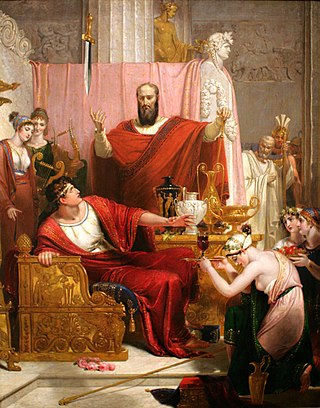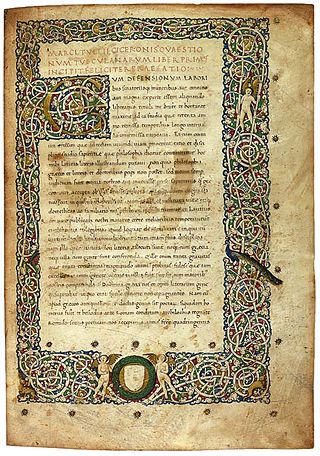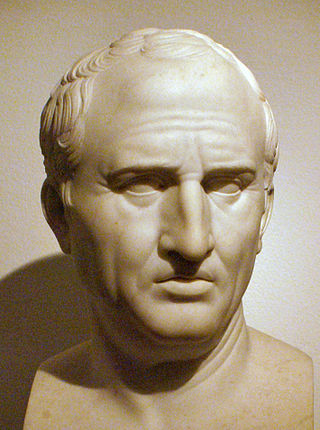Related Research Articles

Marcus Porcius Cato, also known as Cato the Censor, the Elder and the Wise, was a Roman soldier, senator, and historian known for his conservatism and opposition to Hellenization. He was the first to write history in Latin with his Origines, a now fragmentary work on the history of Rome. His work De agri cultura, a rambling work on agriculture, farming, rituals, and recipes, is the oldest extant prose written in the Latin language. His epithet "Elder" distinguishes him from his great-grandson Cato the Younger, who opposed Julius Caesar.

Damocles is a character who appears in a anecdote commonly referred to as "the sword of Damocles", an allusion to the imminent and ever-present peril faced by those in positions of power. Damocles was a courtier in the court of Dionysius I of Syracuse, a ruler of Syracuse, Sicily, Magna Graecia, during the classical Greek era.
Crantor of Soli was an Ancient Greek philosopher and member of the Old Academy who was the first philosopher to write commentaries on the works of Plato.

John Eyton Bickersteth Mayor was an English classical scholar, writer and vegetarianism activist.
Macrobius Ambrosius Theodosius, usually referred to as Macrobius, was a Roman provincial who lived during the early fifth century, during late antiquity, the period of time corresponding to the Later Roman Empire, and when Latin was as widespread as Greek among the elite. He is primarily known for his writings, which include the widely copied and read Commentarii in Somnium Scipionis about Somnium Scipionis, which was one of the most important sources for Neoplatonism in the Latin West during the Middle Ages; the Saturnalia, a compendium of ancient Roman religious and antiquarian lore; and De differentiis et societatibus graeci latinique verbi, which is now lost. He is the basis for the protagonist Manlius in Iain Pears' book The Dream of Scipio.
James Rendel Harris was an English biblical scholar and curator of manuscripts, who was instrumental in bringing back to light many Syriac Scriptures and other early documents. His contacts at the Saint Catherine's Monastery on Mount Sinai in Egypt enabled twin sisters Agnes Smith Lewis and Margaret Dunlop Gibson to discover there the Sinaitic Palimpsest, the oldest Syriac New Testament document in existence. He subsequently accompanied them on a second trip, with Robert Bensly and Francis Crawford Burkitt, to decipher the palimpsest. He himself discovered there other manuscripts. Harris's Biblical Fragments from Mount Sinai appeared in 1890. He was a Quaker.
Sophrosyne is an ancient Greek concept of an ideal of excellence of character and soundness of mind, which when combined in one well-balanced individual leads to other qualities, such as temperance, moderation, prudence, purity, decorum, and self-control. An adjectival form is "sophron."

Plutarch's Lives of the Noble Greeks and Romans, commonly called Parallel Lives or Plutarch's Lives, is a series of 48 biographies of famous men, arranged in pairs to illuminate their common moral virtues or failings, probably written at the beginning of the second century AD. The surviving Parallel Lives comprises 23 pairs of biographies, each pair consisting of one Greek and one Roman of similar destiny, such as Alexander the Great and Julius Caesar, or Demosthenes and Cicero. It is a work of considerable importance, not only as a source of information about the individuals described, but also about the times in which they lived.

Cato Maior de Senectute is an essay written by Cicero in 44 BC on the subject of aging and death. To lend his reflections greater import, Cicero wrote his essay such that the esteemed Cato the Elder was lecturing to Scipio Aemilianus and Gaius Laelius Sapiens.

Sir William Smith was an English lexicographer. He became known for his advances in the teaching of Greek and Latin in schools.

De re publica is a dialogue on Roman politics by Cicero, written in six books between 54 and 51 BC. The work does not survive in a complete state, and large parts are missing. The surviving sections derive from excerpts preserved in later works and from an incomplete palimpsest uncovered in 1819. Cicero uses the work to explain Roman constitutional theory. Written in imitation of Plato's Republic, it takes the form of a Socratic dialogue in which Scipio Aemilianus takes the role of a wise old man.

The Tusculanae Disputationes is a series of five books written by Cicero, around 45 BC, attempting to popularise Greek philosophy in Ancient Rome, including Stoicism. It is so called as it was reportedly written at his villa in Tusculum. His daughter had recently died and in mourning Cicero devoted himself to philosophical studies. The Tusculan Disputations consist of five books, each on a particular theme: On the contempt of death; On pain; On grief; On emotional disturbances; and whether Virtue alone is sufficient for a happy life.

Laelius de Amicitia is a treatise on friendship (amicitia) by the Roman statesman and author Marcus Tullius Cicero, written in 44 BC.
Charles Duke Yonge was an English historian, classicist and cricketer. He wrote numerous works of modern history, and translated several classical works. His younger brother was George Edward Yonge.

The writings of Marcus Tullius Cicero constitute one of the most renowned collections of historical and philosophical work in all of classical antiquity. Cicero was a Roman politician, lawyer, orator, political theorist, philosopher, and constitutionalist who lived during the years of 106–43 BC. He held the positions of Roman senator and Roman consul (chief-magistrate) and played a critical role in the transformation of the Roman Republic into the Roman Empire. He was extant during the rule of prominent Roman politicians, such as those of Julius Caesar, Pompey, and Marc Antony. Cicero is widely considered one of Rome's greatest orators and prose stylists.
The consolatio or consolatory oration is a type of ceremonial oratory, typically used rhetorically to comfort mourners at funerals. It was one of the most popular classical rhetoric topics, and received new impetus under Renaissance humanism.
Pliny Earle Chase was an American scientist, mathematician, and educator who contributed to the fields of astronomy, electromagnetism, and cryptography, among others.

Edward Walford (1823–1897) was a British magazine editor and a compiler of educational, biographical, genealogical and touristic works, perhaps best known for the final four volumes of Old and New London.
Isaac Errett was a United States clergyman and editor who was a leader in the early Restoration Movement.
On Passions, also translated as On Emotions or On Affections, is a work by the Greek Stoic philosopher Chrysippus dating from the 3rd-century BCE. The book has not survived intact, but around seventy fragments from the work survive in a polemic written against it in the 2nd-century CE by the philosopher-physician Galen. In addition Cicero summarises substantial portions of the work in his 1st-century BCE work Tusculan Disputations. On Passions consisted of four books; of which the first three discussed the Stoic theory of emotions and the fourth book discussed therapy and had a separate title—Therapeutics. Most surviving quotations come from Books 1 and 4, although Galen also provides an account of Book 2 drawn from the 1st-century BCE Stoic philosopher Posidonius. Little or nothing is known about Book 3.
References
- This article incorporates text from a publication now in the public domain : Gilman, D. C.; Peck, H. T.; Colby, F. M., eds. (1905). . New International Encyclopedia (1st ed.). New York: Dodd, Mead.